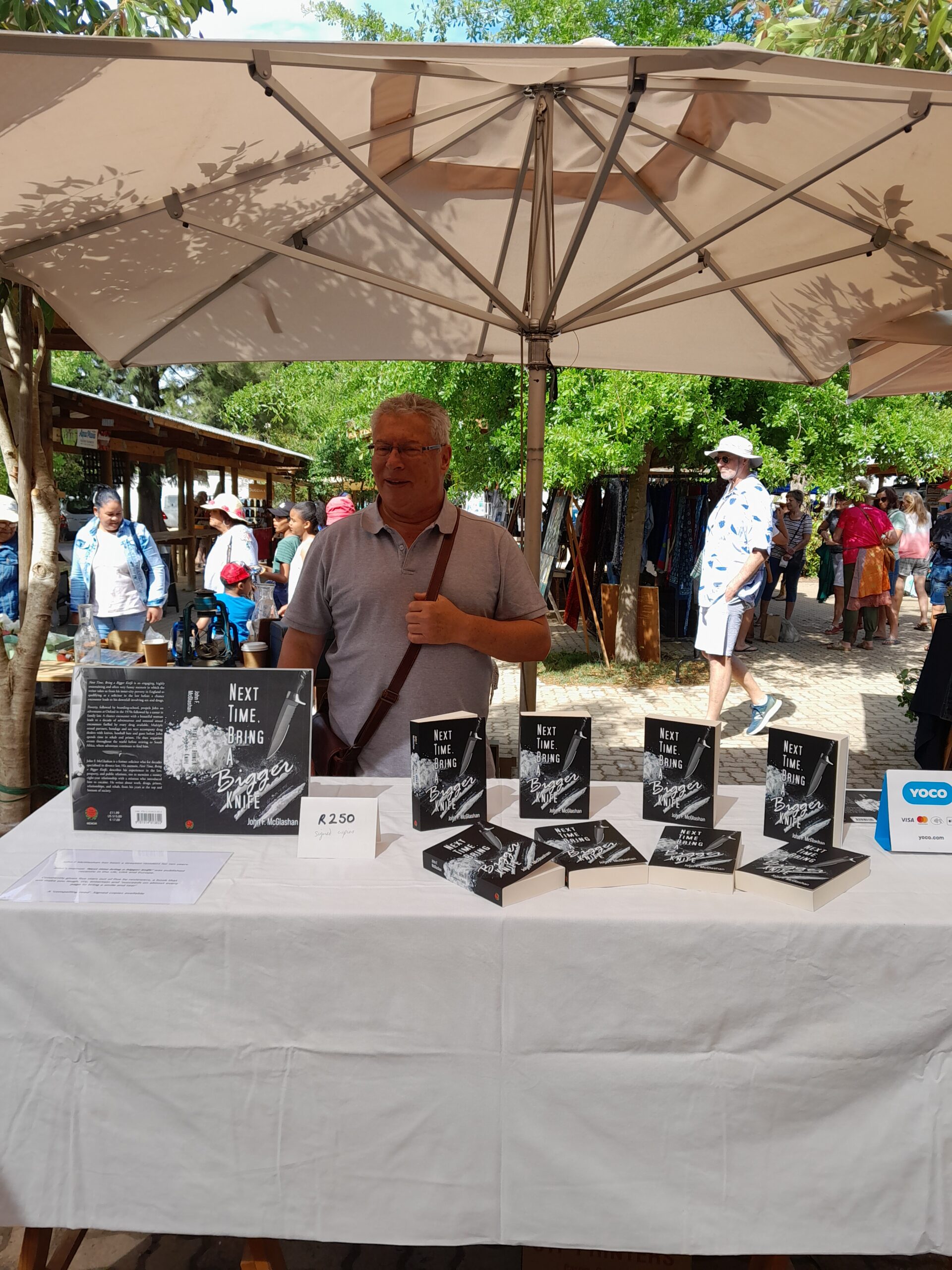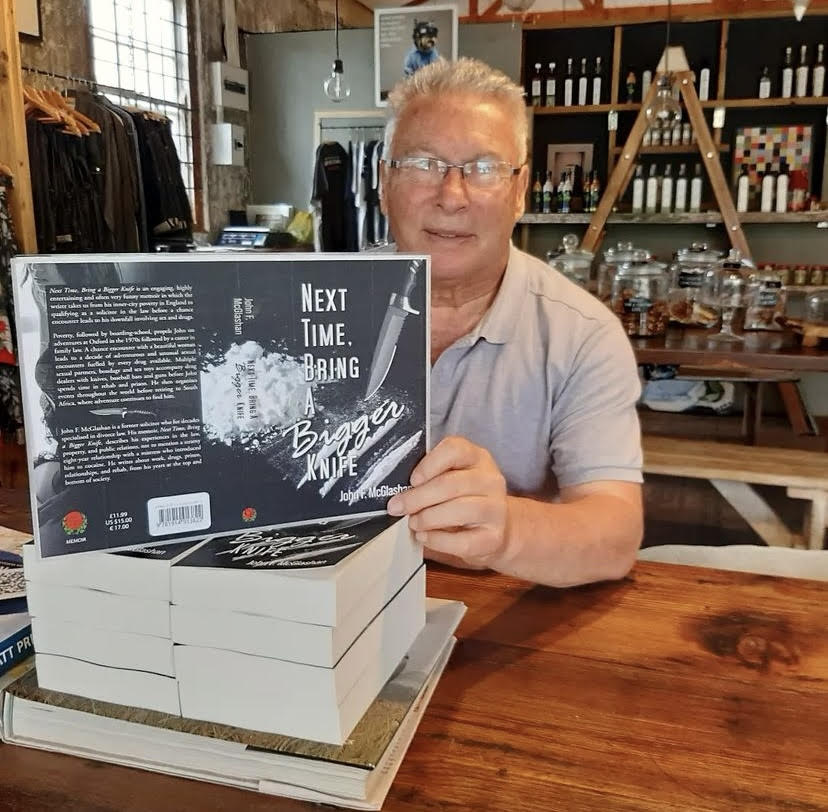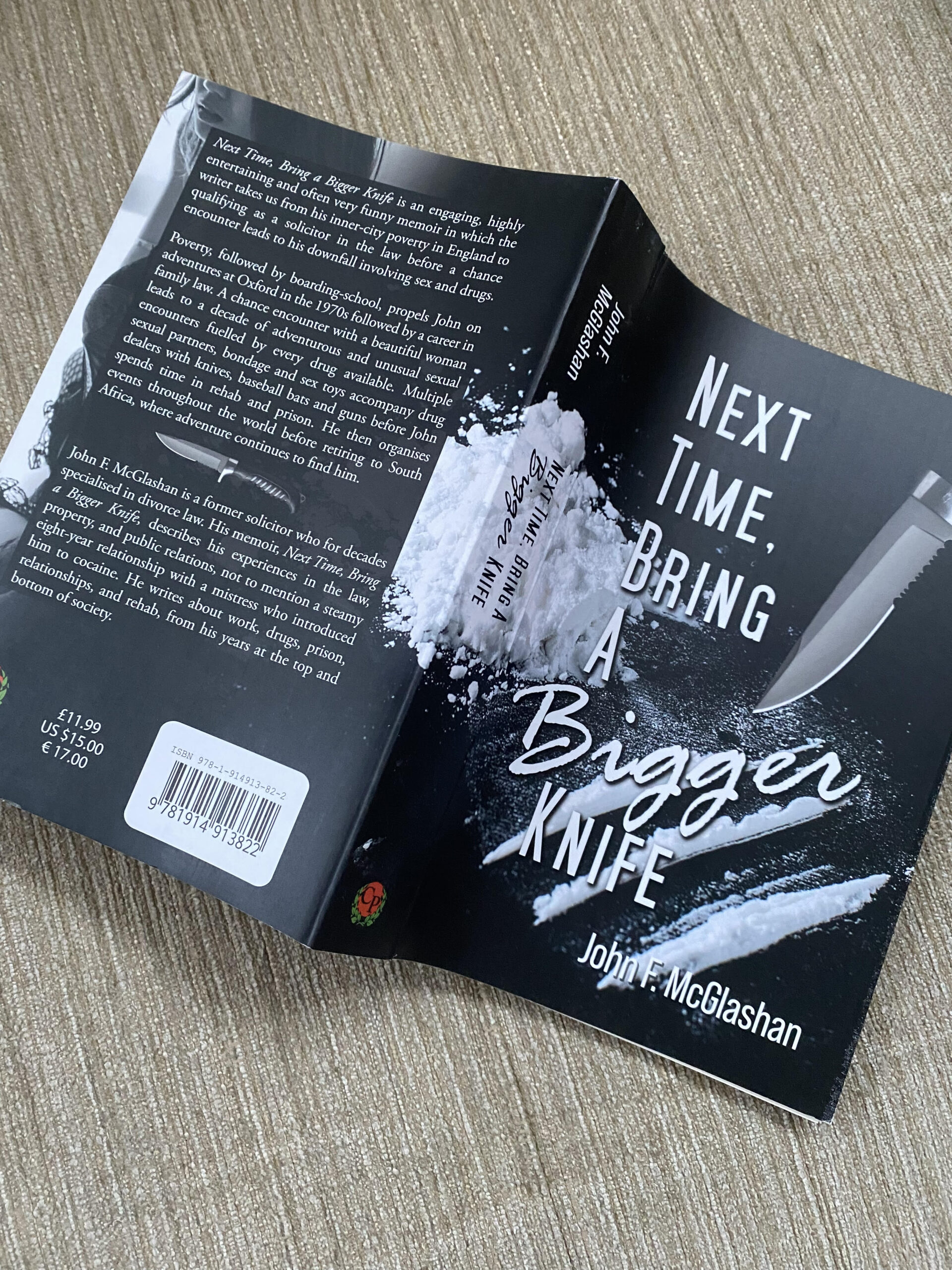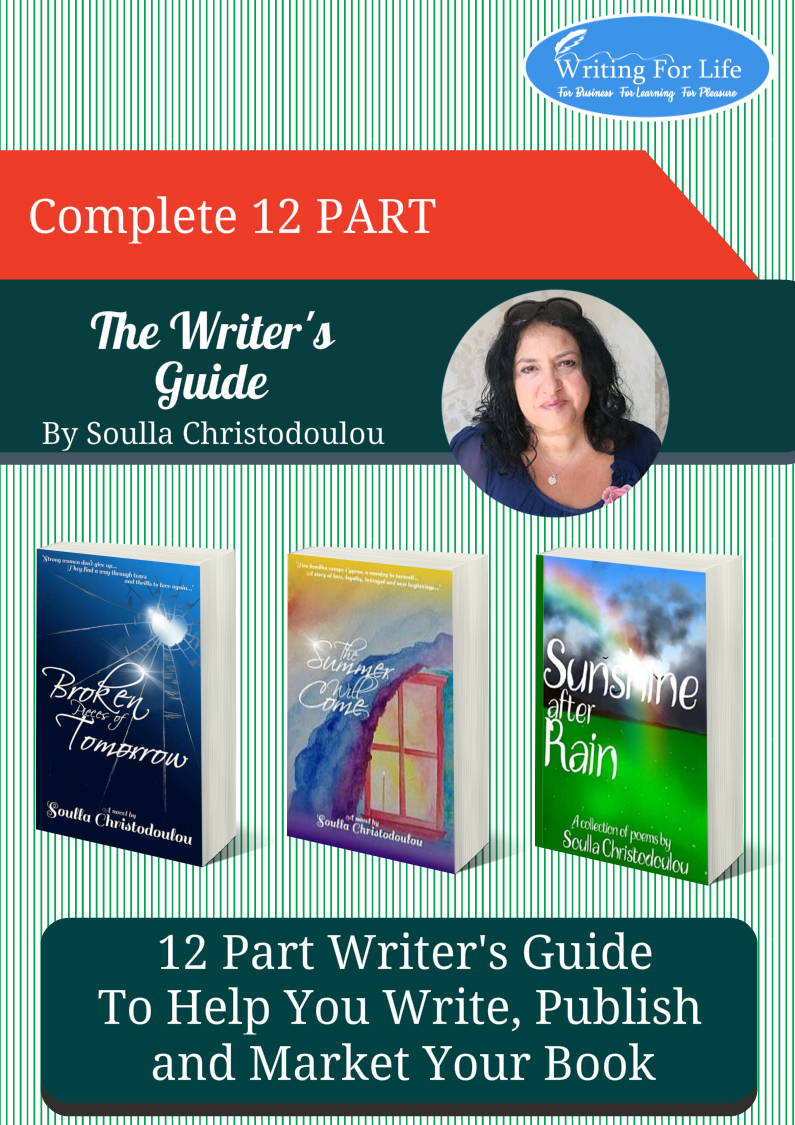Hello and welcome to A Cup of Conversation where I am joined by author John McGlashan published his debut novel, a memoir, Next Time Bring a Bigger Knife, In August 2022 with The Conrad Press.
I’m grateful to have received a copy of the book a couple of weeks ago and I am thoroughly enjoying John’s writing and his ability to draw me in. Look out for my upcoming My Book Love For… blog post coming soon.
It’s a fascinating book of courage and resilience, inspiration and change; it has me thinking and feeling a lot.
In this A Cup of Conversation interview John reveals his life experiences which influenced his writing, what has surprised him most about his journey and his plans for 2023.


1. When did you start writing creatively?
I started writing in the 1980’s and 1990’s when I was asked by Cheshire Life, Yorkshire life
and Lancashire life to write food and wine articles. I think I also did the odd article on
architecture as well. The poorer the food the more creatively I wrote!
2. How did you first become interested in writing stories around your life experiences?
I mention this in my introduction to my book and blog on my website, but I do go to the South of France every year for the past ten years with friends who own a large house there. I let slip some anecdotes from my former life, some funny, some not so, and over time they all said that I should write a book. Not everyone has had my ups and downs. Oxford, the law, mistress, cocaine, crack addict, rehab, prison and getting out of that trap is not on everyone’s CV. Restoring again and finding a loving romance took a bit of time but I got there in the end.
3. What was the most difficult scene to write and how have your readers engaged/reacted to it?
I had an 80-year-old lady stop me yesterday. I don’t know her. She loved my book, and she said it made her laugh and made her cry. I knew I could make people laugh, but I wasn’t sure about the emotion of crying. She said that my stories about volunteering in the Red Cross Hospital for children and an orphanage in Cape Town made her cry. For me that is a sufficient opiate to have written my book. To be able to make people laugh and make
people cry means that my book is good enough. That was always my big fear. My wife
Anneke always said that the book was good enough and she read it about ten times,
correcting each time! She was still chuckling each time she read it which pleased me. A few of my friends knew about my cocaine addiction but none knew the gory details, nor the
descent into the late-night world seeking drugs from dealers who are generally unreliable and sometimes violent or menacing.
I have been really pleased that people have not been judgemental. But I think that shame dies on disclosure and that is what I have accomplished unwittingly.
4. Please share a favourite excerpt from your newly released novel and tell us why you have chosen it.
I would choose the final part of the opening chapter. It sets the tone and shocks a little. I am a lawyer and the day starts with me going to court as usual…
“Chester is a nice venue for a court because the building is impressive. There was no
skimping on the budget when this court was built, hundreds of years earlier. The exterior
looks like something from ancient Greece, but bigger. The wide stone Georgian building with Doric columns dating from about 1800 was once surrounded by lawn but is now overcome with tarmac and parked cars.
The interior of the court surrounds the occupants with forests of oak made into the
panelling and columns or carved and moulded into tables and seats. I had experienced many successful days at Chester Crown Court and over the years it had been a scene of many triumphs for my clients. I knew the buildings well. If you were sentenced to death in the old
days that was the place to get sentenced. The building had gravitas.
As a lawyer, I had represented many people in the Crown Court on the more serious cases. I always felt that when you are guilty, you should plead guilty at the earliest opportunity. The
facts of the case were clear, and the defendant would be pleading guilty, but I was more
involved with family law than criminal law, so I was genuinely unsure as to the appropriate sentence on that day. I wondered what the judge would make of the case and whether there was any point in sending this defendant to prison because he was unlikely to be seen in the
courts again. What weight would the judge give to all the factors. He might take a harsh view and give him a term in prison, or he might suspend the sentence.
In court, the judge is so far away from you in the dock that he appears very tiny. To counter this, he sits on a massive, elevated throne that is fit for a giant. To stand out, even more, the Judge usually wore a red sash draped across his black and purple robes topped with his horsehair wig – a dress that had not changed for two hundred years. I knew both judges who were adjudicating that day from banter in the robing room where lawyers collected during
the day.
My anxiety over what was to happen was with good reason. On that day in August 1996, it
was me facing charges before the judge. I was no longer on the benches representing the
defendant in the dock. I was the defendant in the dock. Surrounded by the sombre dark-suited solicitors, robed barristers in wigs and gowned clerks dressed in black, we all waited for the single most important person in the court – the dispenser of justice – the judge. For a moment, my mind rewound to what had led me to Chester, but I could not allow myself the luxury of drifting back to thoughts of earlier days. Not that day. The panelled Crown Court bench was the scene that I faced from the dock as I looked forward towards the massive empty oak chair of the giant. My life was about to change as the judge entered the court to the words ‘All Rise’. “
5. What has your experience of writing the book taught you about yourself and your writing?
That I am adaptable and resilient. That one needs friends and that I am lucky enough to have had some of the best. I am lucky to be alive and have had some hair-raising experiences and courted death. I never thought that I would be able to write a book. My style being perhaps too brief. I remember doing an affidavit for a woman once who was trying to throw her husband out of the house and I drafted it with the briefest of sentences setting the scene.
“The Respondent husband announced his arrival at the matrimonial home with a brick
through the front window!”
Maybe in writing one ought to expand and set the scene a little more, but I have always
enjoyed writing succinctly and without too much ‘puff’.
6. Who would you most like to meet in the book industry and what two things would you like to ask them.
Margaret Attwood. I would ask her how did you first get published and what effect has TV/film had on your book sales.
7. What has most surprised you about your publishing journey?
The compliments. I am not used to them. One day I had several people bowing down to me in the road. So many have loved reading my book. One or two found it uncomfortable but continued to read it.
I think editing the book, at my end, was a bit slow; I do not see simple mistakes, I gloss over them.
When I was trying to edit the book I kept getting lost in the story again and not keeping my eyes on the ball of editing the text. That surprised me, that after so long I could get lost in the storyline again.
8. What are you working on next?
Either a novel with not too dissimilar background to my past, so there is not too much
research, just a crafted story. Alternatively, I have said almost nothing about overseas in my memoir and I want to do a second overseas volume concentrating on my overseas journeys, some of which I mention briefly. I have spent about a 18 months in the USA and been to over 60 countries and worked in 10. That’s a book right there.
9. What genre books do you enjoy and who are your favourite authors?
Generally nonfiction. But reading a Melinda Ferguson now. I like Bill Bryson for the humour and knowledge and the way he puts life in context. He is very wise.
10. What’s on your to-do list for 2023?
Bali and reading for two weeks in February. South of France in August with my friends The Frosts as usual and the usual crew around the pool from Liverpool. Marketing my first book. Joining Instagram, Website and blogging. Ie: Doing all the things I thought I would never do, just to get my book a bigger audience. There are lessons in my book. I hope someone somewhere reads it and needs to hear those lessons and acts.
Thank you for joining us, John and I wish you all the best as you promote your book! I am certainly enjoying reading it so far.
And to my weekly readers, if you would like to link up with John you can do so on his links listed below.
Website: www.johnfmcglashan.com
Instagram: @jmcglashansa
Book:
Until next week, Happy Reading, Happy Writing, Happy You.
Big hug, Soulla xxx


